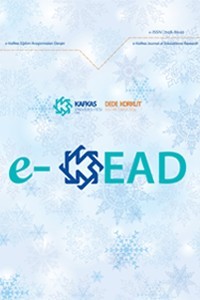Duygu Odaklı Terapi: Psikoterapide Yeni Bir Yaklaşım
Psikoterapi hizmetinden yararlanmak isteyen pek çok kişi yoğun düzeyde korku, kaygı, umutsuzluk, utanç, suçluluk, öfke, üzüntü ve şok gibi duyguların yarattığı sıkışmışlıkla mücadele etmektedirler. Geleneksel psikoterapi yaklaşımları genellikle odaklarını ya duygusal boşalıma ya da düşünce ve davranışları yeniden mantıksal bir çerçevede düzenleyerek duyguları kontrol altına almaya çalışmaktadır. Duygu odaklı terapi ise odağını duygular üzerinden yoğunlaştırarak duyguları terapötik malzeme olarak kullanma imkan sağlar. Bu çalışmada duygu odaklı terapinin amaçları, temel kavramları, bir terapötik bir yaklaşım olarak kullanımı, terapötik hedefleri ve kullandığı teknikler tanıtılarak alan uygulayıcılarına ve danışmanların kullanıma sunulması hedeflenmiştir.
Anahtar Kelimeler:
Duygu, birincil duygu, ikincil duygu, araçsal duygu, duygu odaklı terapi
___
- Corey, G. (2005). Psikolojik danışma, psikoterapi: Kuram ve uygulamaları (T. Ergene, Çev.). Ankara: Mentis Yayınları.
- Crick, N. R. & Dodge, K. A. (1994). A review and reformulation of social information processing mechanisms in children’s social adjustment. Psychological Bulletin, 115, 74-101.
- Greenberg, L. S. (2016). Emotion-focused therapy: Theories of psychotherapy series. (Revised Edition) Washington, DC: American Psychological Association
- Greenberg, L. S., & Goldman, R. (2009). Duygu odaklı terapide vaka formülayonu (Çev. G., M., Bağcı). İçinde T., D. Eels (Ed.). Psikoterapi vaka formülasyonu el kitabı s: 507-550. İstanbul: Litera Yayıncılık.
- Greenberg, L. S. (2002). Emotion-focused therapy: Coaching clients to work through their feelings. Washington, DC: American Psychological Association.
- Greenberg, L. S. (2004a). Emotion-focused therapy. Clinical Psychology and Psychotherapy 11, 3–16.
- Greenberg, L. S. (2004b). Introduction emotional special issues. Clinical Psychology and Psychotherapy, 11, 1-2.
- Greenberg, L. S. (2006). Emotion-focused therapy: A Synopsis. Journal of Contemporary Psychotherapy, 36, 87-93.
- Greenberg, L. S. (2008). Emotion and cognition in psychotherapy: The transforming power of affect. Canadian Psychology, 49(1), 49-59.
- Greenberg, L. S. (2010a). Emotion-focused therapy: A clinical synthesis. The Journal of Lifelong Learning in Psychiatry, 8(1), 32-42.
- Greenberg, L. S. (2010b). Emotion-focused therapy: An overview. Turkish Psychological Counseling and Guidance Journal, 4(33), 1-12.
- Greenberg, L. S. (2011). Emotion-focused therapy. Washington, DC: American Psychological Association.
- Greenberg, L. S. (2014). The therapeutic relationship in emotion-focused therapy. Psychotherapy, 51(3), 350-357.
- Greenberg, L. S., Rice, L., & Elliott, R. (1993). Facilitating emotional change the moment-by moment process. New York: Guildford Press.
- Greenberg, L. S. & Paivio, S. (1997). Working with emotions in psychotherapy. New York: Guildford Press.
- Greenberg, L., S. & Safran, J., D. (1989) Emotion in psychotherapy. American Psychological Association, 44 (I), 19-29.Greenberg, L. S. & Watson, J. (2006). Emotion-focused therapy for depression. Washington, DC: American Psychological Association.
- Goldman, R., & Greenberg, L. (2014). Case formulation in emotion-focused therapy co creating clinical maps for change. Washington, D.C. American Psychological Association.
- Harris, J., Kelley, L., Campbell, E., & Hammond, E. (2014). Key strategies training for individual psychotherapy: an introduction to multitheoretical practice. Journal of Psychotherapy Integration, 24(2), 138-152.Jarry, J., & Paivio, S. (2006). Emotion-focused therapy for anger. In E.L. Feindler (Ed.) Anger-related disorders: A practitioner's guide to comparative treatments. s 223-239. New York: Springer Publishing Company.
- Johnson, S., & Johnson, S. (2004). The practice of emotionally focused couple therapy: creating connection (2nd ed.). New York: Brunner-Routledge.
- Paivio, S. (2013). Essential processes in emotion-focused therapy. Psychotherapy, 50(3), 341-345.Pascual-Leone, A., Gilles, P., Singh, T., & Andreescu, C. (2013). Problem anger in psychotherapy: An emotion-focused perspective on hate, rage, and rejecting anger. Journal of Contemporary Psychotherapy, 43, 83-92.
- Timulak, L. (2011). Developing your counselling and psychotherapy skills and practice. Los Angeles: SAGE.
- Watson, J., Goldman, R., & Greenberg, L. (2007). Case studies in emotion-focused treatment of depression: A comparison of good and poor outcome. Washington, DC: American Psychological Association.
- Yayın Aralığı: Yılda 3 Sayı
- Başlangıç: 2014
- Yayıncı: Kafkas Üniversitesi
